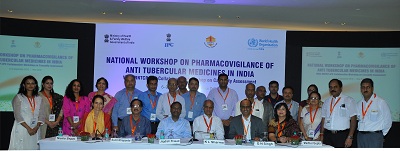
A national workshop was jointly organized by World Health Organization (WHO) along with Revised National Tuberculosis Control programme (RNTCP) and Pharmacovigilance Programme of India (PvPI), Ministry of Health & Family Welfare (MoHFW), Government of India in New Delhi on Pharmacovigilance of Anti Tubercular Medicines in India.
The workshop was aimed at strengthening the capacity of local causality assessment committee members and other stakeholders for effective implementation of Pharmacovigilance for cohort event monitoring of Bedaquiline, through the cohort event monitoring programme (Conditional Access under Programmatic Management of Drug Resistant Tuberculosis), especially the aspects of causality assessment and data flow from NIKSHAY to Vigiflow for the safety data.
Speaking on the occasion, Dr (Prof) Jagdish Prasad, Director General of Health Services, Government of India highlighted the critical role of site staff in success of this programme and said, “We are committed to accelerate efforts to combat TB in the country. Pharmacovigilance and drug safety monitoring of newer drugs such as Bedaquiline is of pivotal importance, for improving treatment support and adherence – particularly among drug resistant TB cases. This workshop is extremely important to mobilise effective implementation of the cohort event monitoring of Bedaquiline through Conditional Access under Programmatic Management of Drug Resistant Tuberculosis.”
The key principles of cohort event monitoring for Bedaquiline and causality assessment for monitoring ADR reporting were discussed along with deliberations on data flow from peripheries using the suspected ADR monitoring form of PvPI, for likely adverse events from facilities to the DR TB centres.
In his address, Shri K.L Sharma, Joint Secretary (Regulation), Ministry of Health & Family Welfare, Government of India emphasized that, “The dynamic growth of the Pharmacovigilance Programme of India and its integration with public health programmes has been impressive. It is vital to ensure that adequate systems and practices for reporting of the Adverse Drug Reactions are in place to ensure that the benefit of use of medicine outweighs the risks associated with its use.”
WHO has been providing pivotal policy and technical support to the RNTCP and PvPI over the past years, including setting up rigorous pharmacovigilance systems for Bedaquiline as cohort event monitoring and a bridge application for seamless flow of data between NIKSHAY (TB electronic software) and Vigiflow.
Also present at the occasion were Dr G. N. Singh, Secretary-Cum-Scientific Director, Indian Pharmacopeia Commission, Ghaziabad and Drugs Controller General (India), Dr Sunil D Khaparde, Deputy Director General TB, Dr VS Salhotra, Additional Deputy Director General TB and other senior RNTCP officials and coordinators of the ADR monitoring centres
The workshop was attended by key functionaries for Bedaquiline from six identified Drug Resistant TB Centres including Local Causality Assessment Committee members, State TB officers, Medical Officers and Statistical Assistants of RNTCP; and Pharmacovigilance Associates from PVPI.
